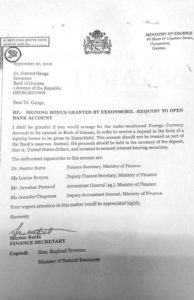Even as the furore over a US$18 million signing bonus the Government received continues, ExxonMobil has distanced itself from Government’s decision to use the money to pay legal fees. While it acknowledged paying the money into the Bank of Guyana account, its input in the process ended there.

According to Exxon’s Senior Director of Public and Government Affairs, Kimberly Brasington, the company followed, and will continue to follow, local laws and regulations it encounters. She noted that while the transaction was a normal one, Exxon did not have a say in Government deciding to use the money for legal fees in Guyana’s border controversy.
“ExxonMobil is committed to the highest standards of business conduct, and we follow all local laws and regulations wherever we operate. A payment was made as a signature bonus to a bank account within the Bank of Guyana, which is owned by the Government as designated in writing by the (Ministry) of Finance.”
“It is common for payments to take place at key stages in the execution of contracts and development of resources. A signatory bonus is a customary and normal part of petroleum agreements. As a commercial entity, ExxonMobil does not have a role in how a sovereign country allocates its revenues,” Brasington explained.
She noted that transparency should apply to all contracts rather than selective contracts. But Brasington also acknowledged the need to protect commercially sensitive and proprietary information, as well as to not violate host government laws or contractual obligations.
Guyana, which had a long-standing agreement with ExxonMobil, renegotiated that agreement after the company’s 2015 oil find in the Stabroek block. In May of that year, Exxon confirmed that more than 295 feet of high-quality oil-bearing sandstone reservoirs were encountered at its Liza 1 exploration well.

Included in the new agreement was a two per cent royalty rate, an increase of one per cent. Government had repeatedly pleaded ignorance to reports that it received a US$20 million signing bonus from Exxon.
Evidence of a bonus being received came to light in a leaked correspondence dated September 20, 2016 and addressed to the Governor of the Bank of Guyana with this subject line: “Signing bonus granted by ExxonMobil – Request to open bank account”.
It shows that Finance Secretary at the Finance Ministry, Hector Butts, had requested that a foreign currency account be opened at the Bank in order to receive a deposit in the form of a ‘signing bonus’ to be given by ExxonMobil.
The letter stated, “This account should not be treated as part of the Bank’s reserves. Instead, the proceeds should be held in the currency of the deposit, that is United States dollars, and invested in secured interest-bearing securities.”
The missive also listed the signatories to the account: Hector Butts, Finance Secretary at the Finance Ministry; Louise Bouyea, Deputy Finance Secretary at the Finance Ministry; Jawahar Persaud, Accountant General (Acting) at the Finance Ministry; and Jennifer Chapman, Deputy Accountant General at the Finance Ministry. The letter was also copied to Natural Resources Minister Raphael Trotman.
Amid criticism, Government officials have defended the secrecy by saying the money would be used to pay legal fees in defence of Guyana’s sovereignty, should its case with Venezuela reach the International Court of Justice (ICJ).
Meanwhile, President David Granger on Friday addressed the issue of the signing bonus during a press conference – his first in over a year. When asked whether he accepted that placing the US$18 million outside the Consolidated Fund was illegal, he insisted that he would not knowingly do something illegal.
“The absence of disclosure does not necessarily mean the presence of deceit. I think it was explained by the Foreign Minister and myself that there was very good reason. It has not been proven that there was a crime,” he said.
“It was a course of action that was recommended, and we feel that where the money is located at present would insulate it from being misused or stolen. So, I don’t believe there is any illegality, graft or corruption. It was put there for a purpose and if we are advised by the lawyers that it does not conform to the financial regulations, we will comply with a court order or advice. But, at present, the money is safe; it belongs to the Guyanese people,” Granger added.



